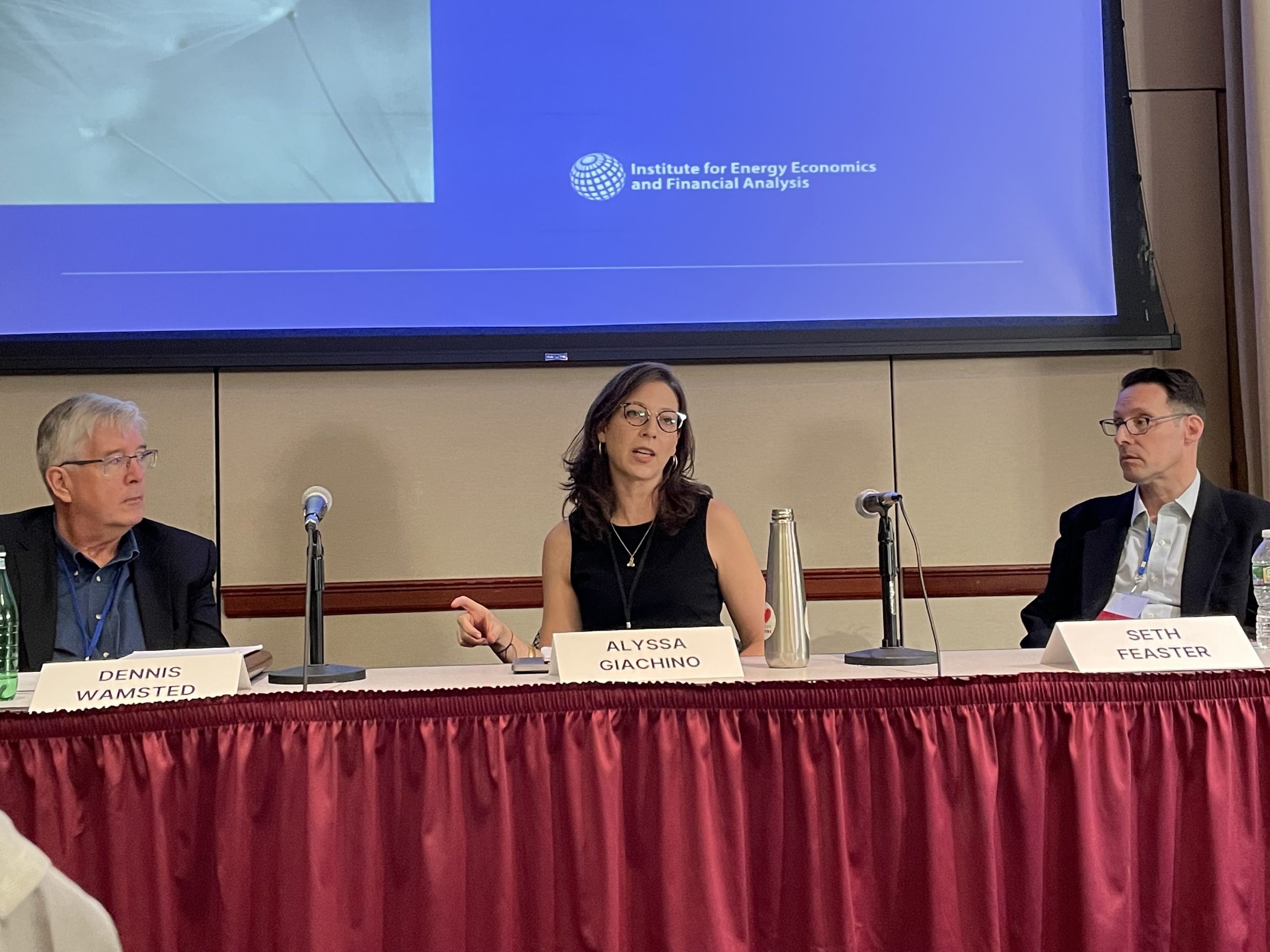
Private equity’s role in climate crisis a center point of Energy Finance conference
October 19, 2022
Private equity’s role in climate crisis a center point of Energy Finance conference
PESP climate director presents findings of new PE scorecard report
On Monday, Private Equity Stakeholder Project (PESP) Climate Director Alyssa Giachino spoke on a panel titled “Private Equity’s Fossil Fuel Problem” at the Institute for Energy Economics and Financial Analysis (IEEFA) Energy Finance Conference 2022. Private equity (PE) has experienced rapid growth, with around $10 trillion in assets under management. This growth has been especially pronounced in the energy sector, with $1 trillion invested in energy assets since 2010—the vast majority of which being in fossil fuels. The growth in PE firms is changing the finance sector, and with these large investments in energy, these firms have a significant role in propelling the climate crisis.
“An analysis of eight, large PE buyout firms shows their energy portfolios currently exceed $200 billion,” Giachino said. “This rivals the top international banks’ fossil fuel lending in size, but comes with even less visibility and disclosure.”
In the panel, Giachino discussed private equity’s greenwashing tactics. Like other financial players, the PE industry has largely adopted environmental, social and governance (ESG) messaging, but there’s not much evidence that this commitment is more than window dressing—in most cases it appears ESG is used as a cover for business as usual. PESP has recently analyzed PE’s greenwashing of their investments, showing how firms such as The Carlyle Group set net zero goals while still doubling down on fossil fuel holdings. Additionally, the Associated Press reported just a few weeks ago that Carlyle’s own Task Force on Climate Related Financial Disclosure report left out its largest oil and gas investment— its subsidiary NGP.
“Private equity is operating in the shadows,” Giachino said. “PE firms continue to have a robust appetite for energy investments. The industry also operates opportunistically, so when other companies are seeking to exit energy investments and offload their fossil fuel assets, PE will often step in. Despite ongoing deal activity in fossil fuels, many of the large PE firms are downplaying their role in environmental harms and climate change. This lack of transparency directly translates into increased risk to the public and investors.”
Because of the lack of regulation of private markets, the hazards these firms pose to investors continue to rise. Private equity’s capital comes not only from endowments and wealthy investors, but also pension funds for public employees such as teachers, nurses and firefighters. The industry has created large climate risks for these investors, especially as these firms act as fiduciaries of public sector workers’ retirement savings. As societal sentiment grows in support of a clean energy economy, the environmental risks of doubling down on dirty energy assets are becoming clear.
Giachino added, “On one hand, we have the PE industry touting renewable investments and ESG practices, while on the other hand, we have evidence of billions of dollars currently deployed in fossil fuels. Americans for Financial Reform Education Fund and PESP developed a scorecard to cut through the rhetoric, measuring not just private equity’s words but its actions.”
The result is a new scorecard report endorsed by eleven other research and activist organizations. The Private Equity Climate Risks scorecard is first-of-its-kind research, shining a light on the climate harms of eight major private equity firms’ polluting investments. The climate scorecard ranks the private equity firms based on metrics around their energy holdings and emissions, as well as their efforts to mitigate the damage of their investments on the changing climate. The Carlyle Group ranks last with an “F” grade, due to its large portfolio of fossil fuel holdings and weak climate policies. Following it are Warburg Pincus, KKR, Brookfield and its subsidiary Oaktree, Ares, Apollo, Blackstone, and TPG. Collectively, these eight firms oversee a combined $3.6 trillion in assets under management.
“The billions of dollars private equity firms have invested to drill, frack, transport, store and refine fossil fuels stand in contrast to what climate scientists and international policymakers have called for to align our trajectory to the 1.5 degrees Celsius warming scenario,” Giachino said. “Public workers’ retirement funds bear the risks of fossil fuel investments when society is transitioning to more renewables. Private equity firms are primarily fiduciaries of those capital commitments. They should position their portfolios to advance the transition to green energy, not invest in fossil fuels that only serve to prolong our dependence on dirty energy and deepen the injustice and intensity of the climate crisis.”
You can find more information about PESP’s climate research by visiting pestakeholder.org/issues/climate-and-energy/. Download the 2022 PE Climate Risks Scorecard at peclimaterisks.org.
